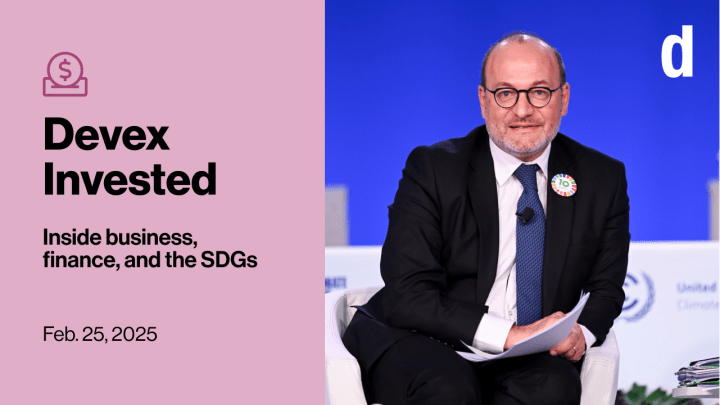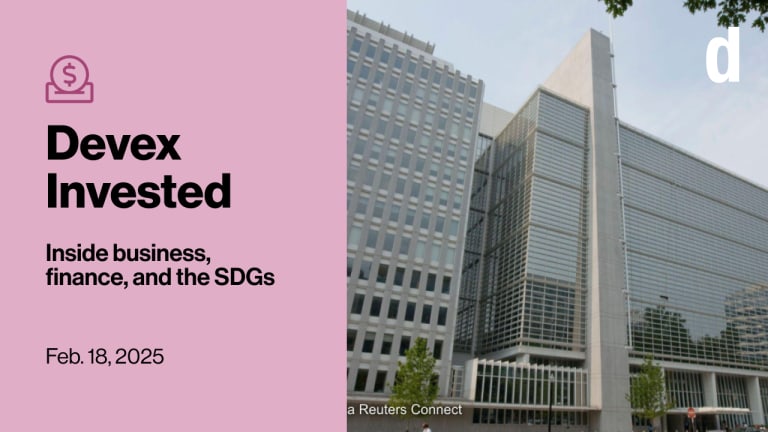
The head of the French Development Agency said something interesting last week.
Asked about the impact of the Trump administration’s cuts to foreign aid, Rémy Rioux told Radio Classique that the U.S. president is throwing into question a kind of broad agreement — or “grand accord” — that had existed between Europe and the United States.
“The U.S. took care of security and humanitarian aid … and they do three times as much as the Europeans there,” Rioux said. “But in exchange, the Europeans, with the U.K. and Norway, took care of development — that is, long-term investments, etc. We are three times bigger than the Americans. So if there is a new deal, we have to talk with all the numbers on the table. Europe represents $150 billion each year for development.”
This is a preview of Devex Invested
Sign up to this weekly newsletter to get the insider brief on business, finance, and the SDGs in your inbox every Tuesday.
There is no sign of a new deal on foreign aid burden sharing for now. But Rioux is among those thinking about how to use this year’s International Conference on Financing for Development in Seville, Spain, to strike out in a new direction.
There is no shortage of ideas — from giving debt-relief efforts more teeth to rethinking (by which we think this Brookings paper means ditching) the 0.7% target of gross national income going to official development assistance.
Expect plenty of discussion along those lines in South Africa this week, where the Finance in Common Summit of public development banks is taking place. The agenda is here. And follow our own Adva Saldinger who is on the ground in Cape Town.
Adva will be looking at how those public development banks, which account for more than 10% of annual investments worldwide, are working to be more strategic and coordinated on a variety of issues, including climate finance. She’ll be tracking currency fluctuation challenges, infrastructure investments, and the often illusive private capital mobilization. She’ll also be asking whether and how these institutions might step up as traditional public aid dollars drop. If you’ll be at FiCS and want to connect, please reach out to Adva at adva.saldinger@devex.com.
Related: As US aid falters, development finance trends to watch in 2025 (Pro)
+ Join us on March 4 for a discussion with U.S. Rep. Ami Bera. He’ll bring his expertise as a senior congressional voice on foreign affairs to examine ways shifting global dynamics are influencing U.S. development policy decisions. Save your spot today and submit your questions in advance.
This event is exclusive to Devex Pro members. If you aren’t a Pro member yet, start a 15-day free trial now to access all our exclusive content and events.
The ungreening of Europe?
All eyes are on Brussels this week, with the European Commission due to release a legislative proposal tomorrow with amendments to the so-called EU Green Deal. For the commission, it’s about slashing red tape and increasing competitiveness. But NGOs and some members of the European Parliament see an attempt to backtrack on hard-fought gains on corporate sustainability reporting, or CSRD; supply chain transparency rules, or CSDDD; and an EU taxonomy on which economic activities are considered green.
Commenting on a leaked proposal, revealed over the weekend, ClientEarth said that rather than merely simplifying reporting requirements (as the commission claims), the new text “drastically weakens corporate responsibility by limiting due diligence to direct business partners, and watering down climate transition plan obligations.”
And the world-first carbon border adjustment mechanism, or CBAM, is in the spotlight too.
Reuters reported that the levy — designed to protect the EU market from carbon-intensive imports but bitterly opposed by low-income countries — could be altered to exempt “the vast majority” of companies because they only produce 1% of the emissions of the scheme.
If you are available around noon Central European Time tomorrow, you can watch the Brussels press pack grill the commission.
ICYMI: EU carbon tax could dwarf aid to Africa, and countries aren’t ready
Background reading: DFIs warn ‘impractical’ EU Green Deal rules will harm global south (Pro)
Buy the numbers
The world’s largest philanthropic givers spent $11 billion on development in 2022, according to figures from the Organisation for Economic Co-operation and Development. That’s 8.2% less than 2021 spending.
Devex’s Miguel Antonio Tamonan and Alecsondra Kieren Si have crunched the numbers to look at the top 10 foundations and their priority areas. Because those 10 largest players spent $8.6 billion — nearly 80% of the total amount tracked by OECD.
Read: How much did the largest foundations spend on development? (Pro)
+ To keep up to date with global development's latest funding opportunities, data-driven analysis, and funding insights, sign up for Devex Money Matters, our free Monday newsletter.
With partners like this
Not many people have heard about the 79-member Organisation of African, Caribbean, Pacific States, or OACPS, but you can bet the European Investment Bank has. That’s because OACPS provides the legal basis for the bank’s external lending mandate outside Europe. That was one of the main reasons, after all, that European leaders said they needed to sign a new 20-year partnership agreement with OACPS in November 2023.
But there’s a problem.
Your next job?
Senior Financial Sector Specialist
Asian Infrastructure Investment Bank
China
As we reported exclusively last week, the European Commission (which has been financially propping up OACPS for years) now has a draft audit on its desk showing potentially systemic problems with the management of EU funds. Think nonexistent procurement procedures and claiming expenses for domestic cleaners and children’s school fees without being able to show that the cleaners or children exist. Add to that an OACPS internal document, also seen by Devex, showing “suspected fraud” on €30,000 of senior management’s credit card payments (and questions over €97,000 more) and almost €1 million in unpaid salaries.
An official from an ACP country, speaking on condition of anonymity, says the organization is now “completely bankrupt” and makes its 79 members “embarrassed permanently.”
An OACPS spokesperson tells us that only an “initial audit” has been tabled and that ahead of a final version, “it remains imperative that no definitive conclusions be drawn.”
But here is a question for the jurists among you: If the whole organization folds (as now seems possible), what does that mean for EIB’s lending outside Europe?
Scoop: ‘Suspected fraud’ at EU-backed African, Caribbean, Pacific org
ICYMI: EU halts funding as OACPS woes ‘more serious than expected’ (Pro)
What we’re reading
Would it actually be the worst thing if China filled gaps left by U.S. foreign aid? [The Canberra Times]
The United Kingdom’s development investment arm spent £7 million on business class flights. [Financial Times]
BlackRock’s quiet signal: The natural capital market awakens. [Natural Capital Trader]




